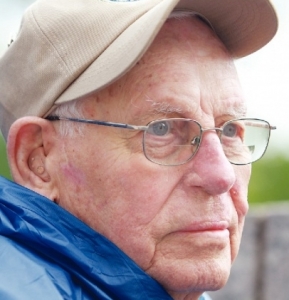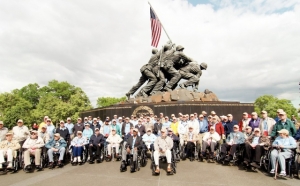Heroes' journey: Hallett Mayo, 90, finally shares his battle memories
By Kenneth Fine
Published in News on May 5, 2011 1:46 PM

News-Argus/MICHAEL BETTS
"I made up my mind 50 years ago that if anyone asked me a question, I'd give them a yes or no. My own family -- brothers, sisters and Daddy -- I said, 'I'm gonna tell you all one time. That's it. So listen here.'" HALLETT MAYO on his decision not to talk about his World War II experience until this week.

The veterans who made the trip to Washington, D.C., pose in front of the United States Marine Corps Memorial.
WASHINGTON -- There was something fitting about the way the raindrops danced off Hallett Mayo's cap -- how the 90-year-old quipped at the gray skies that greeted him at the World War II Memorial.
But those veterans who joined him on a day trip to the nation's capital had no idea that the man was once betrayed by similar weather -- that a storm that unfolded more than 60 years ago resulted in him suffering countless wounds that have never fully healed.
The 19 sons of Wayne County who boarded a plane bound for Washington, D.C., Wednesday before sunrise will forever be connected by their service during a war that, in many ways, has defined each of them ever since.
But as they moved from monument to monument -- and ceremony to ceremony -- with the dozens of others who participated in the Triangle Flight of Honor, none seemed to realize that there was a man among them whose experience was far different than most who survived the second World War.
*
Mayo's unit had been in France for several days before they saw any combat.
"We landed at Omaha Beach but it was not invasion day," he said. "We went in immediately after the invasion. We were replacements."
But with his eyes closed, the former soldier can still imagine all that unfolded in the hours before he reached the shore.
"Can you imagine those poor damn guys going up that cliff? Twenty-two feet they had to climb to get on level ground," Mayo said. "No wonder we had big casualties. And for every one who died you had 10 injured. ... Those were good boys, too. It's a horror story."
And so, too, was his own tale -- one that would begin when he and his comrades reached St. Lo.
"The Air Force had just leveled it. We didn't do like they do now. The Air Force went over and dropped leaflets that said, 'Get out cause we're gonna bomb this town,'" he said. "To make a long story short, they bombed it good. That was the first real bombing I ever saw. That kind of thing sticks with you. Those B-17s were something else. They dropped a load and flattened it.
"After that, we saw some combat along the outskirts of St. Lo and from then on, it was combat all the way across France."
But the images of bullets flying don't seem to haunt the man who now resides in Walnut Creek.
It's the saga he has only discussed a few times with his immediate family -- the one he has held close since his return from Europe -- that still stirs him.
It was Oct. 6, 1944 -- the night when a notion as simple as staying dry would lead to his undoing.
Mayo and more than a half-dozen other members of the 3rd Army's 5th Infantry Division had just completed a mission outside Metz when they made a decision that would change their lives.
"All we had to do was wait for the troops to get to us or us to get to them, but it was pouring rain and there was a darned old World War I gun mount -- mostly referred to as a 'pill box,'" he said. "They were half underground and it was raining, so one of the boys said, 'Why don't we go in there and stay dry?'
"At first, I said, 'No. It's too dangerous. If they realize where we are, they will damn sure attack.' Well, he said, 'What if I just go see if there's anybody in that damn pill box?' Within a few minutes, everybody wanted to go. Well, to make a long story short, we made that damn terrible mistake."
Within 15 minutes, German forces had the men pinned down.
"They hit us with flame throwers and grenades," Mayo said. "We didn't stand a chance."
And after a particular grenade blast knocked him out, the man who once thought he was invincible -- along with the others who survived the attack -- was taken prisoner.
"The pretty part of the Army I was in was that you were young. You had not yet been tamed. You knew damn well there was trouble. You knew that, but it's like these kids now who drive 90 miles an hour. You say, 'It aint me who's gonna get killed. It's that other guy who's gonna get killed,'" Mayo said. " But when I came to, the wrong people had the rifles."
The soldiers were paraded through Metz by their captors the next day -- spit on, verbally abused, hit with rocks.
But Mayo's "hell" began at the Stalag 12-A prison.
"All of us went through interrogation. Oh my God," he said. "They had no mercy."
And beyond the physical abuse they suffered there, they were forced to survive on sugar beets and water.
"You know what we do with the pulp from sugar beets in this country?" Mayo said. "We feed cattle with it."
The soldier remained at the prison for more than a month, when he and the other POWs were transferred to Stalag 2-B, the scene, historians say, of the worst treatment of captives at any camp established for American POWs before the Battle of the Bulge.
"When we got off those damn box cars, the snow was level with the door," he said. "Jesus it was cold."
And the lack of nourishment was taking its toll -- Mayo weighed 172 pounds when he was captured and 119 when he was finally freed months later.
So there were many nights when prayer was the only thing that seemed to make any sense.
And there were many more when Mayo was sure he would die in captivity.
But the worst, he would find, was yet to come.
It was January 1945.
"When the Germans finally realized the Russians were gonna overpower them, they moved us," Mayo said.
And they would be moved on foot -- brought along for the German retreat from the Russians until May 1.
"We kind of figured how many miles we had covered on foot. We had it at 575, something like that," Mayo said. "I don't know how many of us died along the way."
But 20 miles before the Germans reached Berlin, Mayo and his comrades were liberated.
The Russians had caught up with the enemy.
"They didn't do us any harm, but they didn't do us any good either," Mayo said.
And so, as ranking officer, the buck sergeant was left to lead some 300 men to the nearest Allied stronghold.
"We were trained. We knew what to do if we got liberated. The guy with the most rank had the responsibility and that responsibility happened to fall on me," Mayo said. "So I knew where the British were and I knew exactly what was going on there."
And he knew that if they could find transportation, the former POWs could avoid another confrontation with enemy forces.
"So we just took this poor farmer's tractors and fuel ... and made our way," he said. "But we were on our own."
Mayo and his men would eventually make it to the Allies.
"They de-loused us," he said. "Gave us British uniforms."
And within a few days, they began their journey back to American-occupied Germany.
"When the planes arrived to pick us up, they were old B-17s that they had taken the bomb racks out of. They put us in there like a bunch of hogs," Mayo said with a chuckle. "Damn, it was like home sweet home."
But the months that preceded their rescue are relived, by the man, every day -- even if, until now, he hasn't made his story public.
"I made up my mind 50 years ago that if anyone asked me a question, I'd give them a yes or no," he said. "My own family -- brothers, sisters and Daddy -- I said, 'I'm gonna tell you all one time. That's it. So listen here.'"
*
Hours after those World War II veterans left the memorial built in their honor, they removed their caps as a Marine Corps bugler played taps in front of a monument dedicated to those who lost their lives at Iwo Jima.
It was the first time Wednesday that many of them -- including Mayo -- had showed much emotion.
And when, moments later, the light rain that had followed those men and women for the better part of the day stopped and the sun broke out of the gray skies, many looked up and gave thanks.
It was a reminder that, in many ways, time has caught up with those who once measured victory by firefights won, wounds healed and friends spared -- that their battles, now, are with chilly breezes, illnesses and waning memories.
Perhaps that is why Mayo, just a few days before he celebrated his 90th birthday, finally told his story -- why he chose to join nearly 100 of his comrades for a day of private memorials and reflection.
"I never wanted anyone accusing me of stretching anything because I don't have to. That's the reason I've played hush mouth all these years," he said. "But the theory that you're gonna forget that stuff, it's wrong, so at some point, you have to get it off your chest, I guess. Shit yeah I can still see it."
